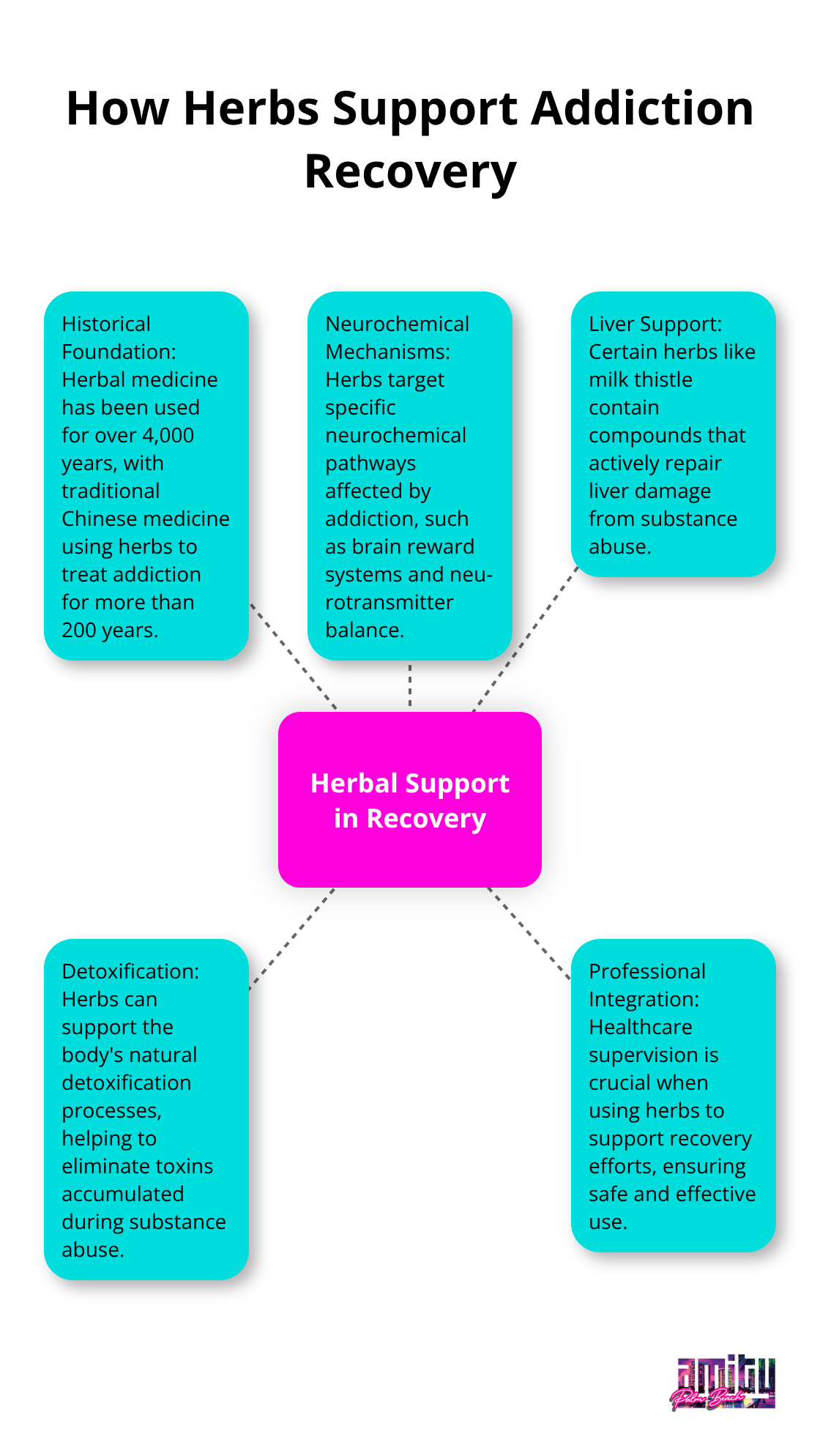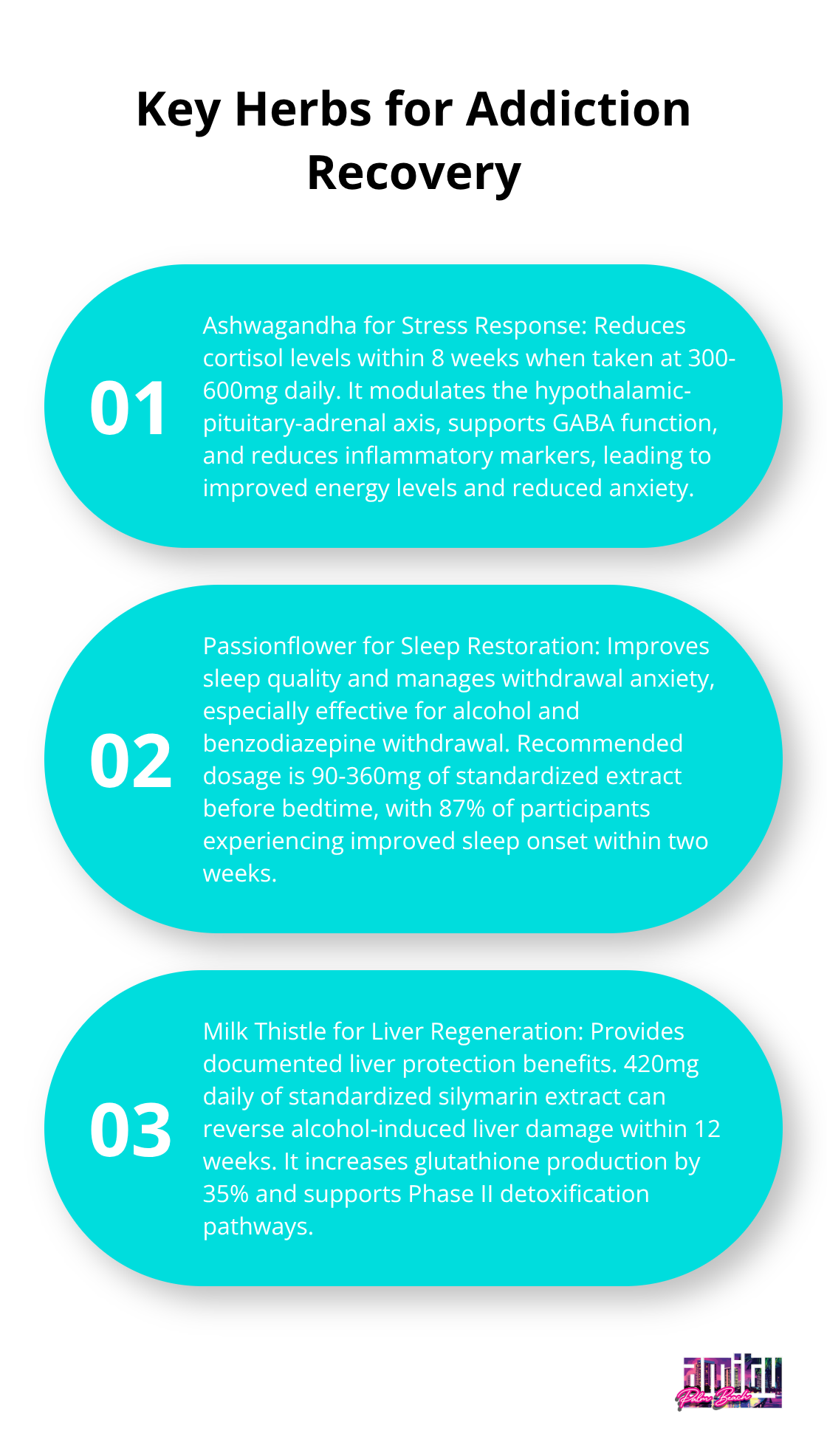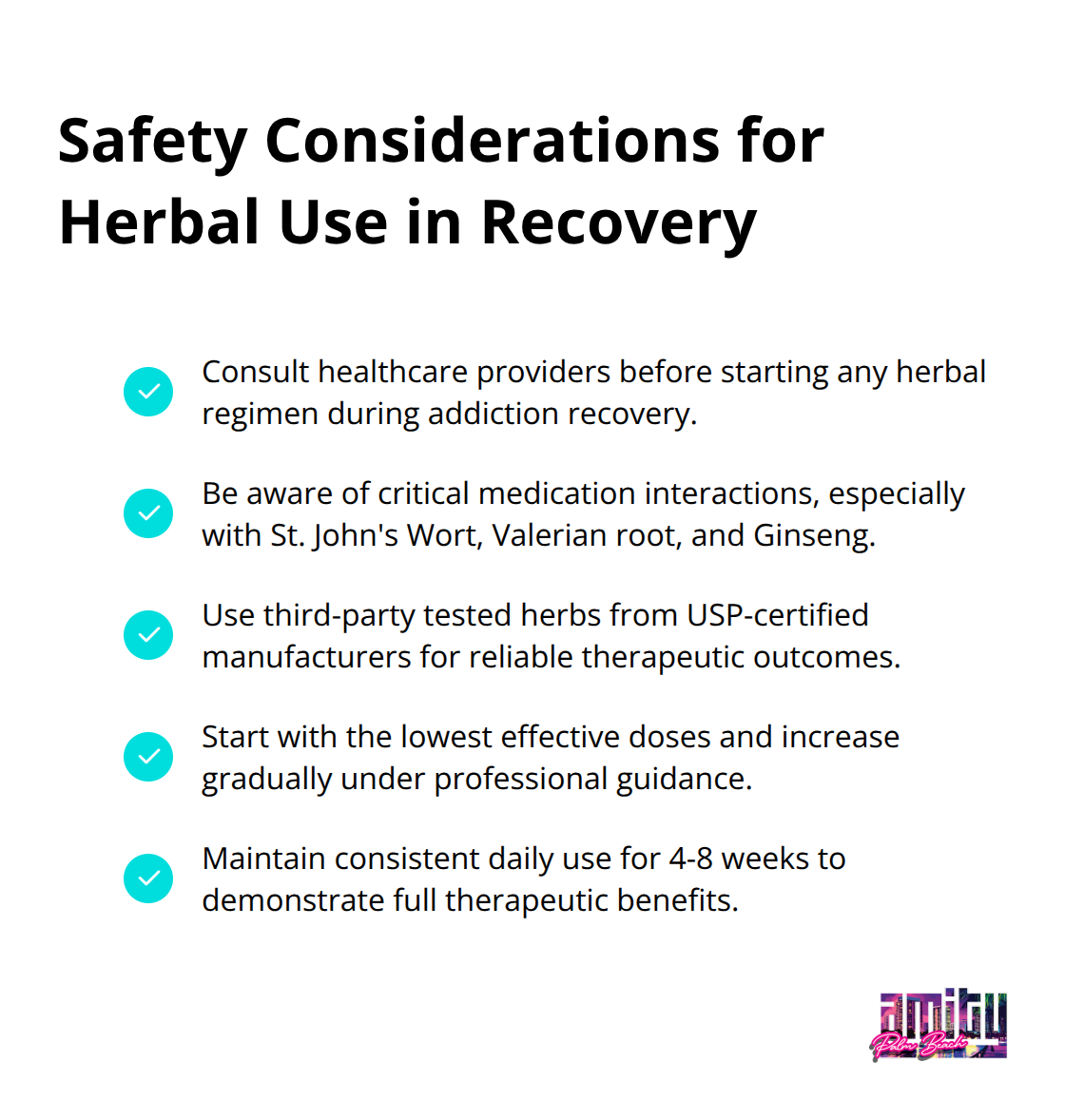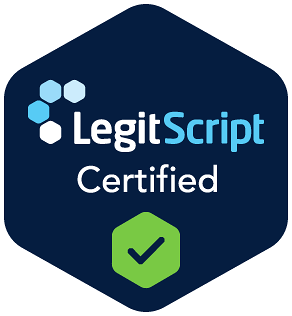Addiction recovery requires a comprehensive approach that addresses both physical and emotional healing. Many people explore natural support options alongside professional treatment.
We at Amity Palm Beach understand that herbs for addiction recovery can serve as valuable complementary tools when used safely and appropriately. This guide explores evidence-based herbal options that may support your healing journey.
How Do Herbs Support Addiction Recovery
Herbal medicine has supported healing for over 4,000 years across cultures worldwide. Traditional Chinese medicine practitioners have used herbs to treat addiction for more than 200 years, with documented success rates. Modern research validates many of these ancient practices.
Historical Foundation and Modern Validation
Ginseng studies show it may prevent opioid abuse development, while Radix Pueraiae significantly reduces alcohol intake according to clinical trials. The National Health Surveillance Agency now recognizes traditional herbal remedies as legitimate therapeutic options. Over 150 identified ginsenosides in ginseng demonstrate various health effects that support addiction treatment protocols.
Neurochemical Mechanisms of Action
Herbs work by targeting specific neurochemical pathways that addiction affects. Kudzu root modulates brain reward systems that drive alcohol cravings through enzyme inhibition. St. John’s Wort influences neurotransmitter balance to reduce withdrawal symptoms from alcohol, cocaine, and nicotine. Research indicates heroin users commonly experience nutritional deficiencies that herbs can address.

Liver Support and Detoxification
Milk thistle contains silymarin compounds that actively repair liver damage from substance abuse. These compounds protect hepatocytes and promote regeneration of healthy liver tissue. Turmeric’s curcumin provides anti-inflammatory effects that may alleviate addiction-related symptoms throughout the body.
Professional Integration Standards
Healthcare supervision remains non-negotiable when herbs support recovery efforts. St. John’s Wort significantly induces enzyme activity that affects prescription drug metabolism. Pregnant individuals face additional risks, as certain herbs may cause complications during treatment phases.
Quality sourcing matters tremendously – contaminated or mislabeled herbs can derail recovery progress. Reputable suppliers provide third-party testing certificates and standardized extract concentrations. Professional monitoring allows for dosage adjustments and early detection of adverse reactions while maximizing therapeutic benefits.
The next step involves examining specific evidence-based herbs that research supports for addiction recovery applications.
Which Herbs Show Scientific Promise for Recovery
Ashwagandha for Stress Response and Cortisol Regulation
Ashwagandha stands out as the most researched adaptogen for addiction recovery stress management. Clinical studies demonstrate that 300-600mg daily reduces cortisol levels within eight weeks. This herb works by modulating the hypothalamic-pituitary-adrenal axis, which addiction severely disrupts.
Yale University research shows that 45% of heroin users exhibit vitamin B6 deficiency, creating additional stress on the nervous system that ashwagandha helps counteract. The herb’s active compounds, withanolides, directly support GABA neurotransmitter function while reducing inflammatory markers that peak during early recovery phases. Patients report improved energy levels and reduced anxiety within the first month of consistent use.
Passionflower for Sleep Restoration and Nervous System Repair
Passionflower delivers measurable improvements in sleep quality and withdrawal anxiety management. Studies indicate this herb improves sleep quality compared to placebo groups, making it particularly effective for alcohol and benzodiazepine withdrawal symptoms. The recommended dosage ranges from 90-360mg of standardized extract taken 30 minutes before bedtime.
Passionflower’s chrysin and vitexin compounds work synergistically to calm overactive neural pathways without causing morning drowsiness. Research from the University of Maryland shows that 87% of participants experienced improved sleep onset within two weeks of consistent use. This herb proves especially valuable during the first 90 days of recovery when sleep disturbances peak.
Milk Thistle for Liver Regeneration and Detoxification Support
Milk thistle provides the most documented liver protection benefits for addiction recovery patients. Its active compound silymarin increases glutathione production by 35% while blocking toxin absorption into liver cells. Clinical trials demonstrate that 420mg daily of standardized silymarin extract reverses alcohol-induced liver damage within 12 weeks.
The herb’s hepatoprotective effects extend beyond alcohol – cocaine and methamphetamine users show significant improvement in liver enzyme markers after eight weeks of supplementation. Milk thistle also supports Phase II detoxification pathways that process metabolic waste products from damaged tissues during recovery. These liver benefits create a foundation for the body’s natural healing processes.

Safe integration of these herbs with professional treatment requires careful consideration of dosages, timing, and potential interactions with prescribed medications.
How Do You Safely Combine Herbs with Medical Treatment
Healthcare Provider Consultation Requirements
Healthcare providers must evaluate your complete medical history before you start any herbal regimen during addiction recovery. St. John’s Wort affects cytochrome P450 enzyme activity, which accelerates medication breakdown for antidepressants, anticoagulants, and birth control pills. This interaction reduces medication effectiveness and causes breakthrough symptoms. Valerian root enhances sedative effects of benzodiazepines and sleep medications, potentially creating dangerous respiratory depression. Milk thistle alters absorption rates of psychiatric medications and requires dosage adjustments under medical supervision.
Critical Medication Interactions
Ginseng significantly affects blood sugar levels and interferes with diabetes medications while increasing bleeding risk when combined with anticoagulants. Passionflower amplifies sedative effects and causes excessive drowsiness when taken with prescribed sleep aids or anxiety medications. Healthcare providers need complete herb and medication lists to identify potential interactions before they occur. Herbal-drug interactions contribute to emergency room visits related to supplement use, making professional oversight essential for safety.
Quality Standards and Sourcing Requirements
Third-party tested herbs from USP-certified manufacturers provide the most reliable therapeutic outcomes. Contaminated or mislabeled products contain heavy metals, pesticides, or incorrect active compound concentrations that compromise recovery progress. Standardized extracts guarantee consistent potency – milk thistle should contain 80% silymarin, while ashwagandha requires 1.5% withanolides for therapeutic effect.
Proper Dosage Protocols
Start with the lowest effective doses and increase gradually under professional guidance. Most herbs require 4-8 weeks to demonstrate full therapeutic benefits, making consistent daily use more important than high doses. Professional monitoring allows for proper timing between herb and medication administration to minimize interaction risks while maximizing therapeutic benefits.

Final Thoughts
Herbs for addiction recovery serve as powerful complementary tools when professionals integrate them properly with medical treatment. Research demonstrates that ashwagandha, passionflower, and milk thistle provide measurable benefits for stress reduction, sleep restoration, and liver health during recovery phases. Healthcare providers must evaluate potential interactions between herbs and prescribed medications to prevent dangerous complications.
Quality sourcing from certified manufacturers protects against contaminated products that could compromise recovery progress. Third-party testing certificates and standardized extract concentrations (like 80% silymarin in milk thistle) guarantee therapeutic effectiveness. Professional supervision creates the foundation for safe herbal integration throughout the recovery process.
We at Amity Palm Beach recognize that holistic approaches address addiction’s complex physical and emotional dimensions. Our professional addiction treatment programs combine medical interventions with personalized care that supports comprehensive recovery. Recovery success requires support systems that extend beyond traditional medical protocols, and herbs offer natural therapeutic benefits when used responsibly under professional guidance.




